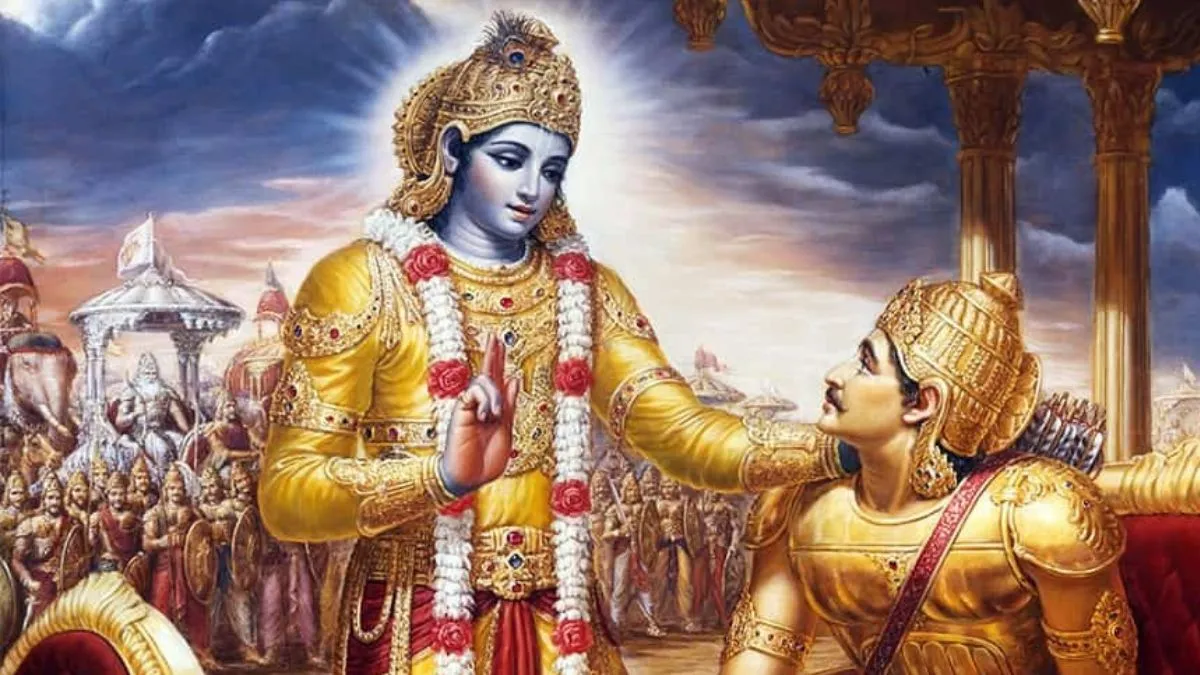- By Kashish Rai
- Fri, 29 Mar 2024 03:01 PM (IST)
- Source:JND
The sixth chapter of the Bhagavad Gita, Dhyana Yoga, compiles the meditation techniques that Sri Krishna revealed. Arjuna is shown the Yoga of Meditation by Sri Krishna, who also teaches the techniques. Sri Krishna discusses the importance of activity in getting ready for meditation and how fulfilling acts of devotion may elevate one's spiritual consciousness and purify the mind.
Lord Krishna describes the challenges one encounters when attempting to master their thoughts as well as the strategies for doing so. Krishna also explains how one might become one with God by concentrating their thoughts on Paramatma. Let us check out 11 verses from the Bhagavad Gita on the benefits of performing yoga.
11 Verses From Bhagavad Gita On Benefits Of Performing Yoga
1. प्रशान्तात्मा विगतभीर्ब्रह्मचारिव्रते स्थित: |
मन: संयम्य मच्चित्तो युक्त आसीत मत्पर: || 14||
praśhāntātmā vigata-bhīr brahmachāri-vrate sthitaḥ
manaḥ sanyamya mach-chitto yukta āsīta mat-paraḥ
With myself alone as the ultimate aim, the watchful yogi should meditate with a calm, brave, and unshakable mind, and with a firm commitment to celibacy.
2. यदा विनियतं चित्तमात्मन्येवावतिष्ठते |
नि:स्पृह: सर्वकामेभ्यो युक्त इत्युच्यते तदा || 18||
yadā viniyataṁ chittam ātmanyevāvatiṣhṭhate
niḥspṛihaḥ sarva-kāmebhyo yukta ityuchyate tadā
They acquire the whole discipline of withdrawing the mind from self-serving desires and fixating it on the supreme benefit of the self.
3. यत्रोपरमते चित्तं निरुद्धं योगसेवया |
यत्र चैवात्मनात्मानं पश्यन्नात्मनि तुष्यति || 20||
yatroparamate chittaṁ niruddhaṁ yoga-sevayā
yatra chaivātmanātmānaṁ paśhyann ātmani tuṣhyati
Through the practice of yoga, the mind becomes peaceful and free from worldly activities. This allows the yogi to see the soul through a cleansed mind and experience inner bliss.
4. तं विद्याद् दु:खसंयोगवियोगं योगसञ्ज्ञितम् |
स निश्चयेन योक्तव्यो योगोऽनिर्विण्णचेतसा || 23||
taṁ vidyād duḥkha-sanyoga-viyogaṁ yogasaṅjñitam
sa niśhchayena yoktavyo yogo ’nirviṇṇa-chetasā
Yoga is the state of severing oneself from union with misery. It is important to practise this yoga with commitment and without negativity.
5. यतो यतो निश्चरति मनश्चञ्चलमस्थिरम् |
ततस्ततो नियम्यैतदात्मन्येव वशं नयेत् || 26||
yato yato niśhcharati manaśh chañchalam asthiram
tatas tato niyamyaitad ātmanyeva vaśhaṁ nayet

Lord Krishna explains the potency of yoga to warrior prince Arjuna in the Bhagavad Gita. (Image Source: ISKCON Bangalore)
One should constantly return their restless and wavering thoughts back to God, no matter where or when it wanders.
6. युञ्जन्नेवं सदात्मानं योगी विगतकल्मष: |
सुखेन ब्रह्मसंस्पर्शमत्यन्तं सुखमश्नुते || 28||
yuñjann evaṁ sadātmānaṁ yogī vigata-kalmaṣhaḥ
sukhena brahma-sansparśham atyantaṁ sukham aśhnute
By merging with God, the self-controlled yogi becomes free from material pollution and attains the ultimate condition of perfect enjoyment via continual communication with the Supreme.
7. असंशयं महाबाहो मनो दुर्निग्रहं चलम् |
अभ्यासेन तु कौन्तेय वैराग्येण च गृह्यते || 35||
asanśhayaṁ mahā-bāho mano durnigrahaṁ chalam
abhyāsena tu kaunteya vairāgyeṇa cha gṛihyate
Lord Krishna said, "What you say is true, O mighty-armed son of Kunti—the mind is indeed very hard to control." But it is controllable with practice and distance.
8. असंयतात्मना योगो दुष्प्राप इति मे मति: |
वश्यात्मना तु यतता शक्योऽवाप्तुमुपायत: || 36||
asaṅyatātmanā yogo duṣhprāpa iti me matiḥ
vaśhyātmanā tu yatatā śhakyo ’vāptum upāyataḥ
For someone with an uncontrolled mind, yoga might be challenging to achieve. Nevertheless, excellence in yoga is achievable for those who have mastered mental control and who work hard using the right techniques.
9. योगिनामपि सर्वेषां मद्गतेनान्तरात्मना |
श्रद्धावान्भजते यो मां स मे युक्ततमो मत: || 47||
yoginām api sarveṣhāṁ mad-gatenāntar-ātmanā
śhraddhāvān bhajate yo māṁ sa me yuktatamo mataḥ
I hold the utmost regard for yogis who have a constant state of absorption in me and who practise devotion to me with a strong sense of faith.
10. युञ्जन्नेवं सदात्मानं योगी विगतकल्मष: |
सुखेन ब्रह्मसंस्पर्शमत्यन्तं सुखमश्नुते || 28||
yuñjann evaṁ sadātmānaṁ yogī vigata-kalmaṣhaḥ
sukhena brahma-sansparśham atyantaṁ sukham aśhnute
By merging with God, the self-controlled yogi becomes free from material pollution and attains the ultimate condition of perfect enjoyment via continual communication with the Supreme.
11. यतो यतो निश्चरति मनश्चञ्चलमस्थिरम् |
ततस्ततो नियम्यैतदात्मन्येव वशं नयेत् || 26||
yato yato niśhcharati manaśh chañchalam asthiram
tatas tato niyamyaitad ātmanyeva vaśhaṁ nayet
One should constantly return their restless and wavering thoughts back to God, no matter where or when it wanders.
